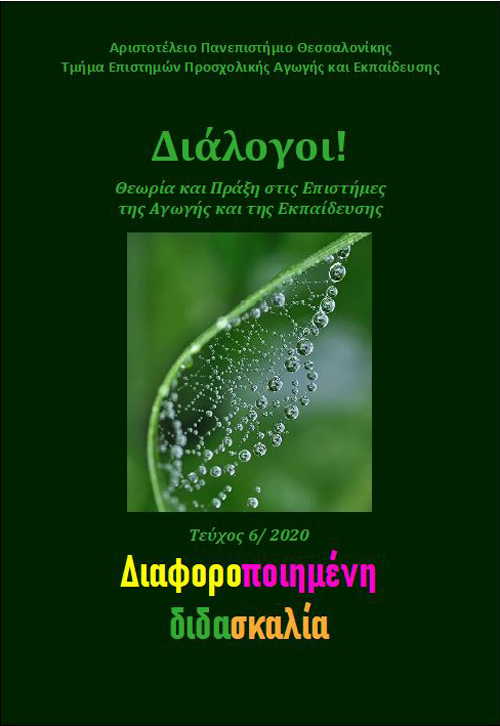Διαφοροποιημένη παιδαγωγική & ενταξιακή εκπαίδευση: θεωρητικές επισημάνσεις, προβληματισμοί και προοπτικές

Περίληψη
Στο πλαίσιο των ταχύτατα μεταβαλλόμενων κοινωνικοπολιτικών συνθηκών και της απόπειρας εναρμόνισης των εκπαιδευτικών πολιτικών, τόσο σε εθνικό όσο και σε διεθνές επίπεδο, αφενός, με τα κυρίαρχα κοινωνικά και οικονομικά δεδομένα και, αφετέρου, με τις διεθνείς διακηρύξεις και συμβάσεις για τα ανθρώπινα δικαιώματα στην εκπαίδευση, η διαφοροποιημένη παιδαγωγική υποδεικνύεται σταθερά ως μια διδακτική πρακτική εν δυνάμει ικανή να ανταποκριθεί στην ετερογένεια του μαθητικού πληθυσμού. Η υπόδειξη αυτή συνοδεύεται από την υπόσχεση της συμβολής της διαφοροποίησης στην πρόληψη της σχολικής αποτυχίας και, ειδικότερα, την ένταξη στη γενική τάξη μαθητών που κατατάσσονται σε ειδικές κατηγορίες του μαθητικού πληθυσμού. Σε αυτό το πλαίσιο, το παρόν άρθρο θα επιχειρήσει να παρουσιάσει το θεωρητικό πλαίσιο βάσει του οποίου η διαφοροποιημένη παιδαγωγική συναρθρώνεται με το πεδίο των ενταξιακών παιδαγωγικών προσεγγίσεων καθώς και τη σύνδεση μεταξύ θεωρητικού λόγου και παιδαγωγικής πράξης στο πεδίο της διαφοροποίησης. Θα καταλήξει θέτοντας μία σειρά ευρύτερων προβληματισμών και αντιφάσεων που σχετίζονται: α) με το κατά πόσο η ανταπόκριση στη μαθητική ετερογένεια μέσα από την υιοθέτηση των αρχών της διαφοροποιημένης παιδαγωγικής, αντανακλάται σε αντίστοιχες αλλαγές στα δομικά χαρακτηριστικά του εκπαιδευτικού συστήματος και β) με το αν η διαφοροποιημένη παιδαγωγική στο υπάρχον πλαίσιο της εκπαιδευτικής πολιτικής εντέλει νοηματοδοτείται ως μια τεχνική διαχείρισης των μαθητών που κατατάσσονται σε «ειδικές» ομάδες του μαθητικού πληθυσμού με απώτερο στόχο την «κανονικοποίησή» τους και τη συνακόλουθη νομιμοποίηση υφιστάμενων πρακτικών διάκρισης και διαχωρισμού.
Λεπτομέρειες άρθρου
- Πώς να δημιουργήσετε Αναφορές
-
Ζώνιου-Σιδέρη Α., Λαμπροπούλου Κ., Παπασταυρινίδου Γ., Τσερμίδου Λ., & Χριστοπούλου Α. (2020). Διαφοροποιημένη παιδαγωγική & ενταξιακή εκπαίδευση: θεωρητικές επισημάνσεις, προβληματισμοί και προοπτικές. Διάλογοι! Θεωρία και πράξη στις επιστήμες αγωγής και εκπαίδευσης, 6, 61–76. https://doi.org/10.12681/dial.23334
- Τεύχος
- Τόμ. 6 (2020)
- Ενότητα
- Ειδικό Θέμα

Αυτή η εργασία είναι αδειοδοτημένη υπό το CC Αναφορά Δημιουργού – Μη Εμπορική Χρήση – Παρόμοια Διανομή 4.0.
Οι συγγραφείς των άρθρων που δημοσιεύονται στο Διάλογοι! Θεωρία και Πράξη στις Επιστήμες Αγωγής και Εκπαίδευσης διατηρούν τα δικαιώματα πνευματικής ιδιοκτησίας επί των άρθρων τους, δίνοντας στο περιοδικό το δικαίωμα της πρώτης δημοσίευσης. Άρθρα που δημοσιεύονται στο Διάλογοι! Θεωρία και Πράξη στις Επιστήμες της Αγωγής και Εκπαίδευσης διατίθενται με άδεια Creative Commons 4.0 και σύμφωνα με την άδεια μπορούν να χρησιμοποιούνται ελεύθερα, με αναφορά στον/στη συγγραφέα και στην πρώτη δημοσίευση για μη κερδοσκοπικούς σκοπούς και με δικαίωμα τροποποίησης μόνον με παρόμοια διανομή (αν αναμείξετε, τροποποιήσετε, ή δημιουργήσετε πάνω στο υλικό, πρέπει να διανείμετε τις δικές σας συνεισφορές υπό την ίδια άδεια όπως και το πρωτότυπο).
To Τμήμα Επιστημών Προσχολικής Αγωγής και Εκπαίδευσης του Αριστοτέλειου Πανεπιστημίου Θεσσαλονίκης και το Εθνικό Κέντρο Τεκμηρίωσης διατηρούν το δικαίωμα να δημοσιεύουν, να αναπαραγάγουν, να παρουσιάζουν στο κοινό, να διανέμουν και να χρησιμοποιούν άρθρα που δημοσιεύονται στο Διάλογοι! Θεωρία και Πράξη στις Επιστήμες Αγωγής και Εκπαίδευσης σε οποιοδήποτε μέσο και μορφή είτε μεμονωμένα είτε ως μέρη συλλογικών έργων, για όλο το χρόνο διάρκειας προστασίας της πνευματικής ιδιοκτησίας και για όλες τις χώρες του κόσμου.
Αυτό περιλαμβάνει ενδεικτικά, και όχι αποκλειστικά, το δικαίωμα δημοσίευσης των άρθρων σε τεύχη του περιοδικού Διάλογοι! Θεωρία και Πράξη στις Επιστήμες Αγωγής και Εκπαίδευσης, αναπαραγωγής και διανομής μεμονωμένων αντιγράφων των άρθρων, αναπαραγωγής ολόκληρων των άρθρων σε άλλη έκδοση του Τμήματος Επιστημών Προσχολικής Αγωγής και Εκπαίδευσης του Αριστοτέλειου Πανεπιστημίου Θεσσαλονίκης και του Εθνικού Κέντρου Τεκμηρίωσης και αναπαραγωγής και διανομής των άρθρων ή περίληψης αυτών με χρήση πληροφορικού συστήματος αποθετηρίου.


